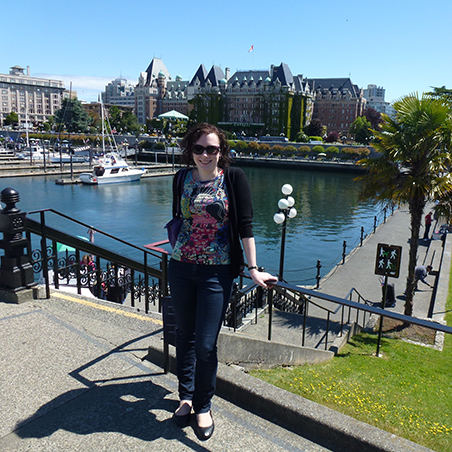Gwenith Cross
Secretariat Manager, Academic Council on the United Nations System
Bachelor of Arts (Hons), History of Science and Technology and History, 2007
If we didn’t exist there would be a lot less dialogue between academics and practitioners.
“I may not be the best example of getting a quick PhD,” says Gwenith Cross with a laugh. She’s right about that. Gwenith began her program at Wilfrid Laurier University in Kitchener-Waterloo in 2009. Her thesis defense didn’t happen until the Spring of 2018.
But Gwenith has a good excuse.
“I got a full time job with the Academic Council on the United Nations System (ACUNS) at the University and it’s easy to put the PhD aside when you are working full time.”
ACUNS brings academics studying the UN system, global governance, international cooperation and multilateral relations together with UN staffers and employees of various NGOs – people who work at what the academics are studying. It has been headquartered over the years at Yale, Brown, and Dartmouth College before setting up shop at Laurier. In the summer of 2018 ACUNS will move to Coventry University in the UK.
Gwenith began as a PhD intern, but didn’t fit the typical profile of an ACUNS intern. She was affiliated with the History Department at Laurier. As she says, “I think they probably expected to get someone from the global governance or politics programs, both of which are very strong, but someone put my name forward and I got the position.”
That position was the organization’s first ever Book Review Editor.
“I had to start the whole project, reaching out to publishers for review copies and to academics to write the reviews.”
The project flourished. Three years later she became Technical and Program Support Administrator. Now she runs the website, “using coding skills I learned along the way,” she says. She helps produce and sometimes hosts the ACUNS podcast using broadcast skills that it turns out she just naturally had. And if that isn’t enough she helps organize international meetings and conferences that bring the academics and practitioners together.
“If we didn’t exist there would be a lot less dialogue between the two groups,” she says. “That’s important. But also ACUNS provides a way for emerging academics and practitioners from the global south to have a voice.”
Gwenith’s work is markedly different from her PhD. Her thesis examines midwifery and the medicalization of childbirth in Ontario and the UK. (Interesting story: the midwife who attended Gwenith’s own birth was partly responsible for Ontario passing legislation making midwifery legal!) Gwenith believes her time at King’s trained her to see the potential of the opportunities around her.
“You study different topics in a holistic curriculum,” she says. “That allows you to pick it apart and see the different avenues available.”
Now with her thesis finally done and ACUNS off to Coventry, Gwenith is looking to explore the multitude of avenues before her.
Posted: April 30, 2018
